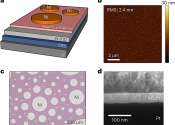Turning up the heat on data storage: New memory device paves the way for AI computing in extreme environments
A smartphone shutting down on a sweltering day is an all-too-common annoyance that may accompany a trip to the beach on a sunny afternoon. Electronic memory within these devices isn't built to handle extreme heat.
Apr 30, 2024
0
72









